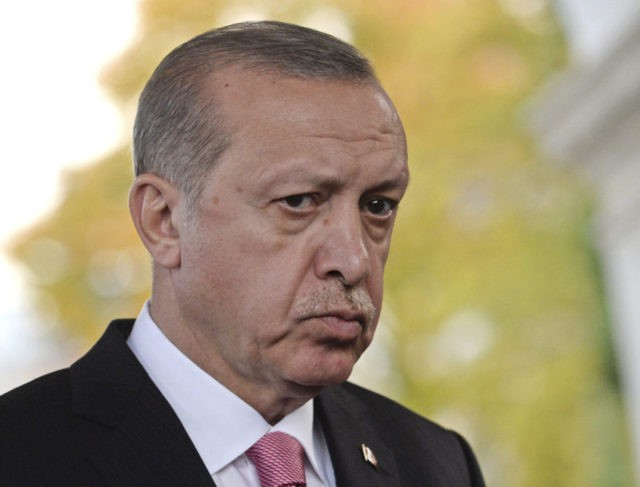State Department spokeswoman Heather Nauert told reporters on Thursday that “sanctions are always on the table” regarding bilateral tensions, answering a question about whether Washington would ever sanction Turkey for its invasion of Syria.
Turkey is a fellow NATO ally and a member of the international coalition against the Islamic State (ISIS), making a move to sanction that government unprecedented. Nauert’s remarks preceded a visit by Secretary of State Rex Tillerson to Ankara, where he met with President Recep Tayyip Erdoğan and counterpart, Foreign Minister Mevlüt Çavuşoğlu. Following Tillerson’s meetings with both, the State Department issued a joint statement with Turkey affirming a mutual commitment to peace.
Prior to that meeting, however, Erdoğan threatened U.S. troops with a military attack, warning the Americans that they had yet to experience “the Ottoman slap.”
While Nauert did not directly address the “slap” threat, she did not categorically dismiss the possibility of sanctions against Turkey.
“As you know, the Secretary is on the ground there, so I’m not going to detail too much about what we may or may not do,” she told reporters. “But sanctions are always on the table with regard to different nations and areas that we may have difficulties with, but you also know we don’t preview sanctions.”
Nauert also noted that, despite tensions surrounding the Turkish military’s presence in Syrian Kurdistan, Erdoğan has not indicated that his government is leaning towards cutting ties to the United States or denying American troops access to the Incirlik airbase.
“Turkey is a part of the D-ISIS Coalition, in addition [to] a NATO ally, so we continue our operations out of there. I’m not aware of any disruptions or any threats regarding disruptions,” Nauert said.
On Turkey’s presence in Syria, Nauert once again repeated that the Trump administration “understand[s] Turkey’s legitimate security concerns” but that Washington hopes all parties “keep the eye on the ball, and that is ISIS.”
The U.S. Treasury does not currently have any sanctions placed on any members of the NATO coalition, which largely consists of European nations. NATO rules also require “collective defense,” meaning that any aggression against one NATO ally will be interpreted as an attack on all of them. Nations may invoke Article 5 of the NATO treaty to request that the allied nations provide military aid against a common enemy when under attack; this article was first used against al-Qaeda after the September 11, 2001, terrorist attacks.
It is unclear how Article 5 would apply to a situation in which Turkish troops attack American forces in Syria.
Turkey began its invasion of northwestern Afrin, Syria, in January, intended to eradicate the Syrian Kurdish People’s Protection Units (YPG/YPJ). The YPG has been one of America’s most effective allies against the Islamic State on the ground. While the Trump administration has not come to the YPG’s defense in Afrin, Turkey has also threatened to send troops barrelling into Manbij, east of Afrin, where U.S. troops are stationed, and attack the U.S. troops “if necessary.”
Turkey’s presence in the region has displaced an estimated 15,000 civilians and forced many to live in ancient caves to avoid being killed by airstrikes.
Tensions between Washington and Ankara appeared to cool on Friday, following an extensive three-hour meeting between Tillerson and Erdoğan that the former referred to as a “productive, open conversation.” While neither government provided details of the meeting, a joint statement from both countries affirmed their commitment to cooperation against terrorism. While mentioning the Kurdistan Workers’ Party (PKK), a U.S.-designated Marxist terrorist organization that Turkey considers indistinguishable from the YPG, it did not mention the YPG by name.

COMMENTS
Please let us know if you're having issues with commenting.